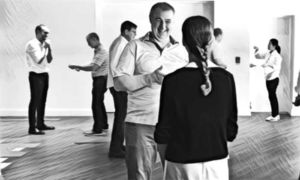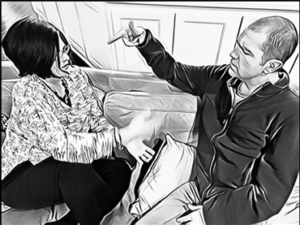Authenticity: More Powerful Than Concealing The Truth
Download a PDF of the entire article here.
by Yancy Wright
 Have you ever felt uncomfortable in your own skin? Pretending to be something or someone that we aren’t can be uncomfortable and exhausting. Most of the time we aren’t aware of the many ways we create this incongruency within ourselves.
Have you ever felt uncomfortable in your own skin? Pretending to be something or someone that we aren’t can be uncomfortable and exhausting. Most of the time we aren’t aware of the many ways we create this incongruency within ourselves.
As a young child, I learned how to assess a situation, quickly determine what someone else (usually a caregiver) wanted, and respond accordingly. My abusive childhood helped me fine tune this skill; I lived in an environment where avoiding getting in trouble was important in securing my physical and emotional safety. Pleasing others became the only way to receive positive attention or at least temporary relief from the abuse. I became a chameleon as I grew into my young adulthood. In my relationships, friendships and at work I was always shape shifting to try and fit in and be accepted. My self-worth was at the effect of how others responded, and I was not in touch with what I truly wanted for myself.
Concealing how I really felt, embellishing the truth, manipulating situations, or omitting what I actually wanted were all (usually unconscious) methods I used to hide the truth. For years I had chronic tightness in my jaw and heavy churning sensations in my stomach, familiar to what I would feel when I was about to be abused as a kid. These areas of the body signaled the hidden debris of unexpressed fear and anger. I simply assumed this was normal–just part of life as a young professional undergoing stress.
Curiosity led me to seek out research on how “normal” concealing is in our society, and it became clear that this type of unconscious behavior is all too common.
According to Y2Analytics “More than half of Americans believe it’s sometimes or often OK to lie to children about a parent’s past misbehavior, and 57 percent say it’s sometimes or often acceptable to exaggerate facts to make a story more interesting”. According to a Reader’s Digest poll “93% of respondents reported one or more kinds of dishonesty at work or school, and 96% reported lying to or committing other dishonest acts toward those close to them”.
My fear of not being accepted, loved or doing something wrong was creating an unconscious commitment to conceal the truth of my experience. I generated the opposite of what I thought I intended. My yearning to please others was creating drama and exhausting my energy reserves. My life became a slippery slope of stories that I would make up about what I could have done, or said, to make things better instead of simply being authentic and revealing my experience without concern for how others might react.
The science of emotional intelligence is beginning to help us understand why expressing our authentic experience is key to our health and wellbeing.
- Unexpressed emotions don’t go away, they get stored in your body.A feeling sparked in our mind-or body will translate as a peptide being released throughout organs, tissues, skin, muscle etc. and all have peptide receptors on them to store emotional information. Emotional memory is stored in many places in the body, not just in the brain. (Candace Pert PhD 1999)1.
- 60% of adults lie at least once within 10 minutes of a normal conversation according to a 2002 study conducted by the University of Massachusetts (Feldman 2012)2.
- Lying requires a lot of effort. When you tell the truth, you simply remember what happens. When you lie you have to consider what you’re trying to hide, figure out a believable version of the opposite, give a convincing performance to sell that lie, and then remember it for the rest of eternity so you never get caught. (Dachis 2012)3.
The first step to being authentic is to be honest with yourself. You need to know your own truth before you can share it with anyone else. Don’t get caught up in your own omissions, lies or limiting beliefs. For example, are you being real with yourself in the morning when looking in the mirror and asking how you feel? Are you able to stop, scan your whole body and respond? If your lower back feels painfully tight, can you acknowledge it and then chose to do something to alleviate that pain versus ignoring and pushing through day after day?
How far do I take this with others? When initially exploring these concepts of deeper authenticity my inner critic wanted to try it out and run the show by jumping into big things I didn’t like about someone. My mind raced with questions around how far should I take this. Do I simply tell the person I was disgusted by the loud chewing of their food? After some challenging (and not well received) experiences of expressing my truth, I realized there is an art to delivering an authentic message. The intention behind it is key.
When someone reacts with anger and defensiveness, it’s typically because I just delivered a message of blame and criticism from my unconscious critic. On the other hand, when I deliver a message speaking from my inner experience, the response is very different. For example, I’ll start with saying, “I notice feeling some uneasiness and tension in my jaw when hearing you eat, and what I really want is to feel present so I can connect to what you are saying.” This yields a very different response, one that isn’t arguable.
 And after several initially awkward attempts of revealing my inner experience, I started getting better at it and life started to get much easier. Being real by communicating to others in this way helped me feel more confident and it created deeper connections with those I care about.
And after several initially awkward attempts of revealing my inner experience, I started getting better at it and life started to get much easier. Being real by communicating to others in this way helped me feel more confident and it created deeper connections with those I care about.
I have learned that being authentic is also about letting go of worrying what others might be thinking, to speak authentically and reveal my inner experience without disclaimers or hesitation. Not concealing or withholding information has built greater trust among friends and loved ones. The more people experience me as authentic, the more trustable I become.
The antidote to concealing is revealing. Authenticity in this way can open up space for deeper connection. In my experience, it also reduced a lot of burden weight I was carrying on my shoulders that fell away the more I shared what I was afraid to say. My fear of disappointing or doing something wrong has diminished as I experience holding myself accountable to a higher level of integrity. Research on authenticity corroborates my anecdotal evidence.
- People who live more authentically report having greater happiness, more positive emotions, better relationships, more personal growth and higher self-esteem versus those who report being less authentic (Wood et al 2008). 4
- People feel less neurotic and more satisfied when they can be authentic in a particular role (friends, lovers, employees, etc.). They also have higher self-esteem and lower stress, anxiety, and depression. Although these studies don’t prove that authenticity necessarily causes greater well-being, they do suggest that authenticity could be an important part of psychological health (Kennon et al 1997). 5
Authenticity starts with asking yourself, is what I say and what I think matching what I chose to do? In other words, do your actions match your desired way of being. This is the path that helped me arrive at feeling more comfortable in my own skin.
Try this authenticity challenge. Check in and ask yourself if you are being honest when someone close to you asks how you are doing? You can always clarify, and ask, “Do you really want to know?” If they confirm yes, tell them what is actually happening for you. Share your inner experience (simple body sensations). This will bring a level of integrity to your own system as well as to the relationship. Concealing even the smallest type of information can dysregulate your system and prevent authentic connection.
Learn more about authenticity here: https://foundationforconsciousliving.org/authenticity/
Yancy Wright, is a visionary leader with an ability to take individuals and teams into realms they never thought were possible. He created https://www.alternavida.com to inspire transformation and growth for individuals, groups, and companies looking to deepen their integrity with themselves, each other, and nature. This article was inspired by the amazing work of Katie and Gay Hendricks https://hendricks.com
1. Pert, Candice. (1999). Molecules Of Emotion: The Science Behind Mind-Body Medicine https://bmcpublichealth.biomedcentral.com/articles/10.1186/1471-2458-11-642
2. Feldman, Robert – Journal of Basic and Applied Social Psychology https://www.umass.edu/newsoffice/article/umass-amherst-researcher-finds-most-people-lie-everyday-conversation
3. Dachis, Adam. What Lying Actually Does To Your Brain And Body Every Day https://www.lifehacker.com.au/2012/12/what-lying-actually-does-to-your-brain-and-body-every-day/
4. Wood, et al (2014) The Authentic Personalty: A Theoretical and Emperical Conceptualization and Development of the Authenticity Scals; The Journal of Counseling Psychology 2008 V3
5. Kennon et al, Trait Self and True Self: Cross-Role Variation in the Big-Five Personality Traits and Its Relationship With Psychology Authenticity and Subjective Wellbeing; Journal of Personality and Social Psychology1997 Vol 73 No. 6)


